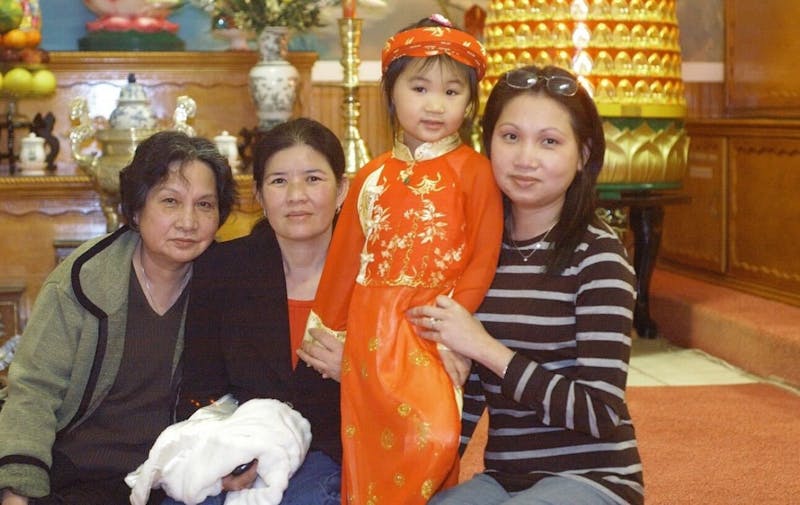Science
Exploring Identity: Kaylee Nguyen’s Journey as a Vietnamese American

Many individuals grapple with their cultural identities, but few articulate their experiences as vividly as Kaylee Nguyen. In her recent reflection, Nguyen delves into her struggles with being Vietnamese in a predominantly white community in Pensacola, Florida. Her narrative captures the complexities of cultural belonging, the weight of expectations, and the challenge of self-acceptance.
Nguyen begins by addressing a common misconception: she does not feel ashamed of her Vietnamese heritage today. Yet, growing up in the Deep South, she faced a unique set of challenges. While Pensacola had a Vietnamese presence, her parents’ reluctance to engage with the community left her feeling isolated. They distanced themselves from social interactions, which compounded her sense of not belonging.
Despite the presence of Vietnamese families, Nguyen felt disconnected. She recalls how community events often felt like performances rather than genuine connections. The adults in her life, rather than offering support, contributed to her feelings of inadequacy. They compared children’s successes while whispering about appearances, leaving her to navigate a complex hierarchy of cultural identity.
She reflects on the internal conflict between her Vietnamese and American identities, stating, “Who is more Vietnamese? Who is more American?” This dichotomy weighed heavily on her, leading to a gradual withdrawal from both cultures. Resentment masked as indifference became a coping mechanism. Nguyen believed she did not need a community, yet moments in Vietnamese restaurants revealed the depth of her longing for connection.
As she transitioned to Johns Hopkins University, the struggle continued. The university’s diverse student body further highlighted her feelings of dislocation. While East Asian and South Asian communities thrived, Nguyen found herself on the fringes, uncertain of where she fit in. She often identified as “from Florida” before acknowledging her Vietnamese roots, illustrating her hesitance to embrace her heritage fully.
Nguyen’s contemplation about writing reflects her complex relationship with her identity. She acknowledges the poignant narratives of others, contrasting them with her own fragmented experiences. Instead of a triumphant rediscovery, her story is a collection of memories—cultural smells, language barriers, and the persistent ache of wanting to belong.
She openly critiques her own biases, confronting the judgments she has made about fellow Vietnamese individuals. This recognition marks a turning point in her journey as she strives to embrace her identity rather than distance herself from it. Nguyen expresses a desire to take pride in her bilingualism, culinary heritage, and the resilience of the Vietnamese people.
Yet, her fears linger. She worries that her words might be misinterpreted—by both American and Vietnamese audiences. The concern over being perceived as ungrateful or too Western underscores the delicate balance she attempts to maintain between her identities. Her reluctance to write about being Vietnamese stems from a desire to avoid misunderstandings and judgment.
Ultimately, Nguyen’s journey reflects a broader struggle faced by many in the diaspora. She identifies herself not only as a writer and student but fundamentally as Kaylee Nguyen. As she continues to explore what this means, she seeks to foster a sense of pride in her heritage and embrace the complexities of her identity.
In sharing her story, Nguyen invites others to reflect on their own experiences of cultural identity and belonging, illustrating that the journey to self-acceptance is often fraught with challenges, yet rich with opportunities for growth and connection.
-

 World2 weeks ago
World2 weeks agoGlobal Air Forces Ranked by Annual Defense Budgets in 2025
-

 World2 weeks ago
World2 weeks agoMass Production of F-35 Fighter Jet Drives Down Costs
-

 Top Stories2 weeks ago
Top Stories2 weeks agoNew ‘Star Trek: Voyager’ Game Demo Released, Players Test Limits
-

 Top Stories2 weeks ago
Top Stories2 weeks agoDirecTV to Launch AI-Driven Ads with User Likenesses in 2026
-

 Science2 weeks ago
Science2 weeks agoTime Crystals Revolutionize Quantum Computing Potential
-

 World2 weeks ago
World2 weeks agoElectrification Challenges Demand Advanced Multiphysics Modeling
-

 Lifestyle2 weeks ago
Lifestyle2 weeks agoLia Thomas Honored with ‘Voice of Inspiration’ Award at Dodgers Event
-

 Entertainment2 weeks ago
Entertainment2 weeks agoFreeport Art Gallery Transforms Waste into Creative Masterpieces
-

 Lifestyle1 week ago
Lifestyle1 week agoDiscover Reese Witherspoon’s Chic Dining Room Style for Under $25
-

 Health1 week ago
Health1 week agoGavin Newsom Critiques Trump’s Health and National Guard Plans
-

 Entertainment2 weeks ago
Entertainment2 weeks agoFast & Furious Coaster Hits the Track at Universal Studios
-

 Health2 weeks ago
Health2 weeks agoResearchers Uncover New Insights into Cancer Mortality Causes









